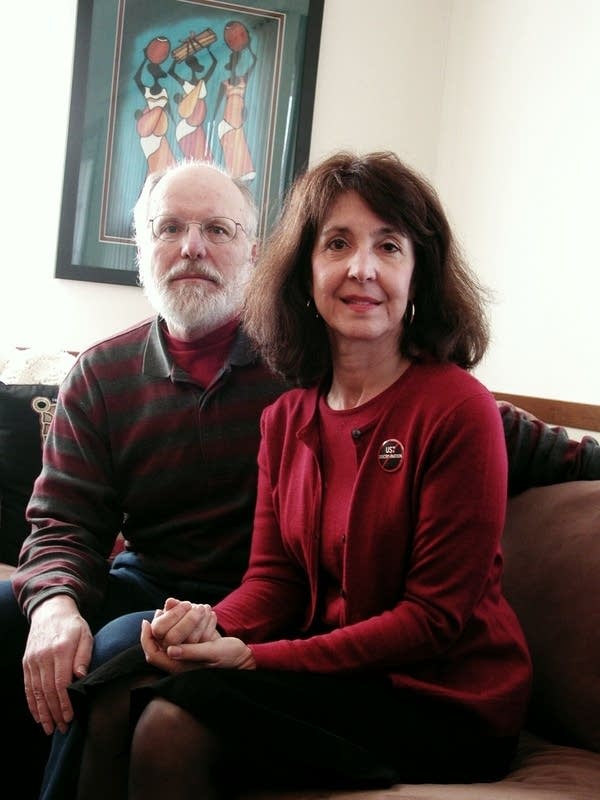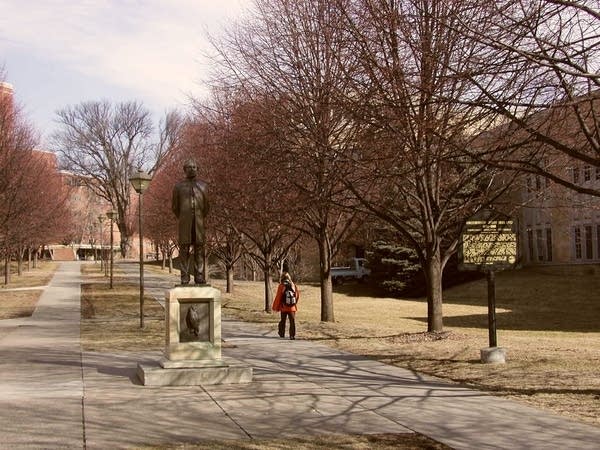St. Thomas faculty protest travel policy
Go Deeper.
Create an account or log in to save stories.
Like this?
Thanks for liking this story! We have added it to a list of your favorite stories.

The debate at St. Thomas calls up difficult discussions about what constitutes a family and the definition of Catholic values. It also exposes the university's uneasy balance between its stance on homosexuality and welcoming talented gay and lesbian faculty.
"There's a chasm between what's happening privately at the university and the public face the university is attempting to present regarding diversity," said Ellen Kennedy a marketing professor at St. Thomas.
Kennedy and her live-in partner Leigh Lawton, also a St. Thomas professor, intended to team teach an intensive overseas course on refugees and human rights in January. Both pulled out of the course after the university administration informed them they would need to stay in separate rooms because they're not married.
"We're a couple. We've been a couple for 12 years," she said. Being apart for four weeks, or for a semester long program isn't something that at this point in our lives we would ever choose to do."
Turn Up Your Support
MPR News helps you turn down the noise and build shared understanding. Turn up your support for this public resource and keep trusted journalism accessible to all.
Kennedy has been at St. Thomas 19 years and says the university has never before been concerned about marital status. In fact, she and Lawton roomed together twice before on trips with students.

The crackdown has prompted a swarm of protest from faculty. Many now refuse to teach the January overseas courses, expressing solidarity against the policy. Several faculty boycotted a recent faculty recognition ceremony in protest. Kennedy's partner Lawton said many of them also see the potential for unwanted off-the-job scrutiny.
"I have a personal life and my expectation when I was hired at St. Thomas given the fact that it's an equal opportunity employer is I could lead my personal life as I see fit," Lawton said. "What's the domain of my personal life? What's the boundary for that?"
More than 130 faculty and staff signed a letter to the administration this month published in the school newspaper condemning the policy. One of the authors of the letter, Sociology Associate Professor Lisa Waldner, worries about the university fostering a witch-hunt type atmosphere. Waldner, a lesbian, said the policy has prompted some instructors to stop inviting students into their homes.
"A faculty member happens to have a pro-choice pamphlet laying around their home, there's contraception in their medicine cabinet and all of a sudden a student might complain that a professor is not living by Catholic values. I think that's the kind of thing that has some of us concerned," she said.

Waldner said she understands the Catholic church's stand against homosexuality, but the university has a policy prohibiting discrimination based on sexual-orientation. She said the university can't have it both ways.
"What I would like to see is the university make up its mind and then act on it," Waldner said. "If they really don't want GLTB (gay, lesbian, transgender and bi-sexual) students, faculty and staff here then say it and students will stop coming here that happen to fit that category."
But, Waldner said, if the university applies the Catholic values standard for gay and lesbian students and faculty, then the same threshold should apply to everyone else. Waldner is the faculty advisor for the group, ALLIES, mainly for gay students. She said the university administration scrutinizes the group's guest speakers and other events more than it does other campus organizations. The university threatened to revoke the group's charter unless it allowed a presentation of the Catholic church's stance on homosexuality.
This is a Catholic university. It stands for something.
Waldner and others also point out the requirement that professors Kennedy and Lawton not room together didn't arise until after a similar situation involving a same sex couple became public. In that case the administration prevented a lesbian choir director and her partner and son from sharing a room on the choir's trip to Europe. The university offered to pay for a separate room. The choir director declined.
With about 10,000 graduate and undergraduate students, St. Thomas is a top ranked regional university. Less than half of students--about 44 percent--are Catholic. It has ambitious fundraising goals to pay for--among other things--the relatively recent addition of a law school.
Tom Rochon, Executive Vice President of Academic Affairs, is the administration's point man on the travel policy. He said St. Thomas does not wish to be the type of institution that requires employees to sign a written pledge of conformance to Catholic moral standards. But he says the university has an expectation of appropriate social behavior around students.
"When choices of private conscience also directly affect students because it's in their face, if you will, that's the distinctive situation we're trying to address," Rochon said.
He said when faculty are traveling with students they are always on duty because everyone is in close proximity. He understands that such a stance could limit the pool of potential faculty and students.

"This is a Catholic university. It stands for something. When people look at an institution that stands for something and has the courage of its convictions they often find that institution to be very attractive," Rochon said.
The Catholic church views homosexual acts as immoral, while at the same time it calls for respect and justice toward gays and lesbians. As for the allegation that the campus climate is unfriendly to homosexuals, Rochon said the picture at St. Thomas is complex.
"What we'd like to do is not get caught up in that broader issue," he said. "We're often put in the position of having to choose between gay rights and homophobia. The position of the Catholic church is nuanced a bit. We have to remember what the sources of our convictions are and the fact that we should not be put simply in one camp or another."
Rochon said he and other administrators are surprised at the reaction by faculty.
Opponents of the travel policy, however, say they're also driven by conviction. Theology Professor David Landry said his decision to speak out is based on the Catholic tenants promoting compassion and social justice.
"This has been building for quite some time that people have thought we've finally had enough," Landry said. "We need to stand up for ourselves and can't let this come from on high and be imposed on us can't let this be imposed on us."
Landry opposition to the travel policy has triggered criticisms that he's anti-Catholic. He said Catholics have not only the right, but the obligation to speak their conscience when they are well informed of an issue but remain convinced their position is the moral one.
Dear reader,
Political debates with family or friends can get heated. But what if there was a way to handle them better?
You can learn how to have civil political conversations with our new e-book!
Download our free e-book, Talking Sense: Have Hard Political Conversations, Better, and learn how to talk without the tension.





